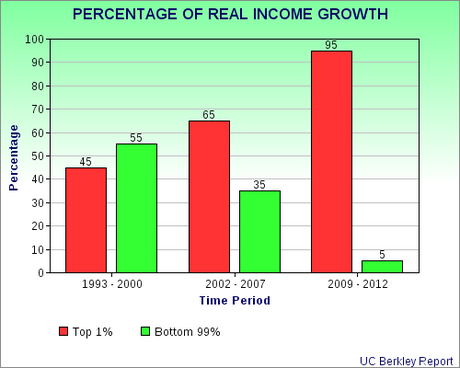 This chart, made from information in the University of California - Berkley report written by Emmanuel Saez, clearly shows just how out-of-whack the economic system in the United States has become. This is not a natural occurrence, but a result of policies put in place by those controlling our federal government.
This chart, made from information in the University of California - Berkley report written by Emmanuel Saez, clearly shows just how out-of-whack the economic system in the United States has become. This is not a natural occurrence, but a result of policies put in place by those controlling our federal government.It began in the presidency of Ronald Reagan, when the Republicans began to institute their "trickle-down" economic policy. This policy said that the more money corporations and rise people made, the more they would share with everyone else (through more jobs and higher wages). It was a silly idea (since money does not trickle down in a capitalist economy -- it moves up), but the Republicans were able to sell it to enough of the public to allow it to be instituted.
By the 1990s, during the presidency of Bill Clinton, this economic policy was taking effect, and the increasing American productivity was starting to be shared less with workers (while more went to owners). During the economic expansion between 1993 and 2000, the richest 1% of American were getting 45% of real income growth while the bottom 99% were getting about 55% of that growth. That was bad enough, and was showing that the new economic policies were not fair to everyone -- but it was to get much worse.
George Bush was elected in 2000, and he doubled-down on the trickle-down policies of Reagan -- further weakening unions, encouraging job outsourcing, cutting taxes for corporations and the rich, and eliminating many of the regulations governing corporations and the financial industry. The effect was to tilt the economic playing field even more in favor of the rich, and during the period of economic expansion between 2002 and 2007 the richest 1% did very well (getting 65% of real income growth, to only 35% for the 99%).
These policies, especially the deregulation of the financial industry, resulted in the Great Recession. While the rich bounced back quickly from that recession, most of the rest of America remains mired in it -- with high unemployment and stagnant wages. And when the economy began to expand again in 2009, the trickle-down policies had a firm grip on the economy (and the Republicans, through abuse of the filibuster and later control of the House, refused to allow any change in those economic policies). In the period between 2009 and 2012, the richest 1% were able to gobble up 95% of all the real income growth while the other 99% of Americans shred in only 5% of that growth.
There is no longer any doubt at all that the economic policies currently in place favor the rich to the detriment of most Americans. It has resulted in the biggest gap in wealth and income between the rich and the rest of America since the 1920s (before the Great Depression). And that gap continues to grow, since the rich are getting almost all of the country's income growth.
These economic policies are indefensible. They are making the rich richer, while making everyone else poorer -- and shrinking the size of the middle class, while increasing the number of Americans who live in poverty. They have turned a thriving economic system that benefitted all Americans into a system that benefits only the rich
We must change, and return to more equitable policies -- like the policies and regulations in place before the Reagan administration. Failure to do so will just further damage this economy, and will result in the U.S. becoming a country of "haves" and "have-nots". We are already too far down that path, with at least 92 other countries having a more equitable economic system (which would have been unthinkable 40 years ago).
But the Republicans have made it clear that they will block any attempt to change those economic policies. The corporations don't want any changes, and the Republicans were long ago bought and paid for by those corporations. The only way to change the system is to vote the Republicans out of power -- and that needs to happen soon, before too much more damage is done.

